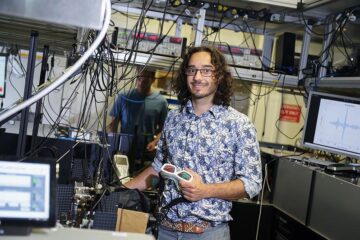Computer science professor from Saarland University wins European Research Award

Measurements with the world’s largest particle accelerator, customer information on the Internet, gene sequences in biology and medicine – vast amounts of data emerge in the fields of research and business. It is not possible to evaluate these data manually. Therefore it is becoming more and more important for industry and science both to search these complex data for patterns automatically, and to evaluate them automatically.
Matthias Hein is determined to improve the methods for automatic data analysis. The professor of computer science and mathematics at Saarland University does research in the field of machine learning. For the analysis of complex data, his research group uses methods which mathematicians subsume under the term “Nonlinear Eigenproblems”.
The European Research Council (ERC) is now supporting this approach with an ERC Starting Grant. Through this program, the European Union wants to give excellent junior scientists opportunities to research the foundations of their field independently and to establish themselves with their own new ideas as top scientists. In 2011, 4080 researchers applied for an ERC Starting Grant; the success rate was 12 percent. This year Hein is among the chosen scientists. Thus, he is now looking forward to research funding of 1.27 million euros over five years.
“With nonlinear eigenproblems, we not only get better solutions for existing problems, but also possibilities to research completely new questions”, Hein says. He adds that the approach works even if the data have been manipulated or quantified incorrectly. Hein and his research group want to develop methods which enable researchers to express their questions as eigenproblems and then solve them. In this way, even other disciplines such as physics or economics could benefit, as in their research fields eigenproblems also appear.
Matthias Hein has been a professor of computer science since 2007. He is head of the research group for machine learning, and principal investigator of the Cluster of Excellence on “Multimodal Computing and Interaction”. Hein is already the third computer science professor at Saarland University to receive an award from the European Research Council. Professor Michael Backes (IT Security and Privacy) received an ERC Starting Grant in June of 2009; in October 2011 Professor Andreas Zeller (Software Engineering) was awarded with the ERC Advanced Grant.
Computer Science on the Saarland University Campus
Apart from the Saarland University Department of Computer Science and the Cluster of Excellence on “Multimodal Computing and Interaction”, there are other research institutes which have a global reputation and which are based at the Saarland University campus. These are the German Research Center for Artificial Intelligence, the Max-Planck Institute for Computer Science, the Max-Planck Institute for Software Systems, the Center for Bioinformatics, the Intel Visual Computing Institute and the Center for IT-Security, Privacy and Accountability.
For further information please contact:
Professor Dr. Matthias Hein
Phone: +49 681 302-57328
E-Mail: hein@cs.uni-saarland.de
Gordon Bolduan
Scientific Communicator
Phone: +49 681 302-70741
E-Mail: gbolduan@mmci.uni-saarland.de
Media Contact
Weitere Informationen:
http://www.uni-saarland.deAlle Nachrichten aus der Kategorie: Förderungen Preise
Neueste Beiträge

Neue universelle lichtbasierte Technik zur Kontrolle der Talpolarisation
Ein internationales Forscherteam berichtet in Nature über eine neue Methode, mit der zum ersten Mal die Talpolarisation in zentrosymmetrischen Bulk-Materialien auf eine nicht materialspezifische Weise erreicht wird. Diese „universelle Technik“…

Tumorzellen hebeln das Immunsystem früh aus
Neu entdeckter Mechanismus könnte Krebs-Immuntherapien deutlich verbessern. Tumore verhindern aktiv, dass sich Immunantworten durch sogenannte zytotoxische T-Zellen bilden, die den Krebs bekämpfen könnten. Wie das genau geschieht, beschreiben jetzt erstmals…

Immunzellen in den Startlöchern: „Allzeit bereit“ ist harte Arbeit
Wenn Krankheitserreger in den Körper eindringen, muss das Immunsystem sofort reagieren und eine Infektion verhindern oder eindämmen. Doch wie halten sich unsere Abwehrzellen bereit, wenn kein Angreifer in Sicht ist?…





















